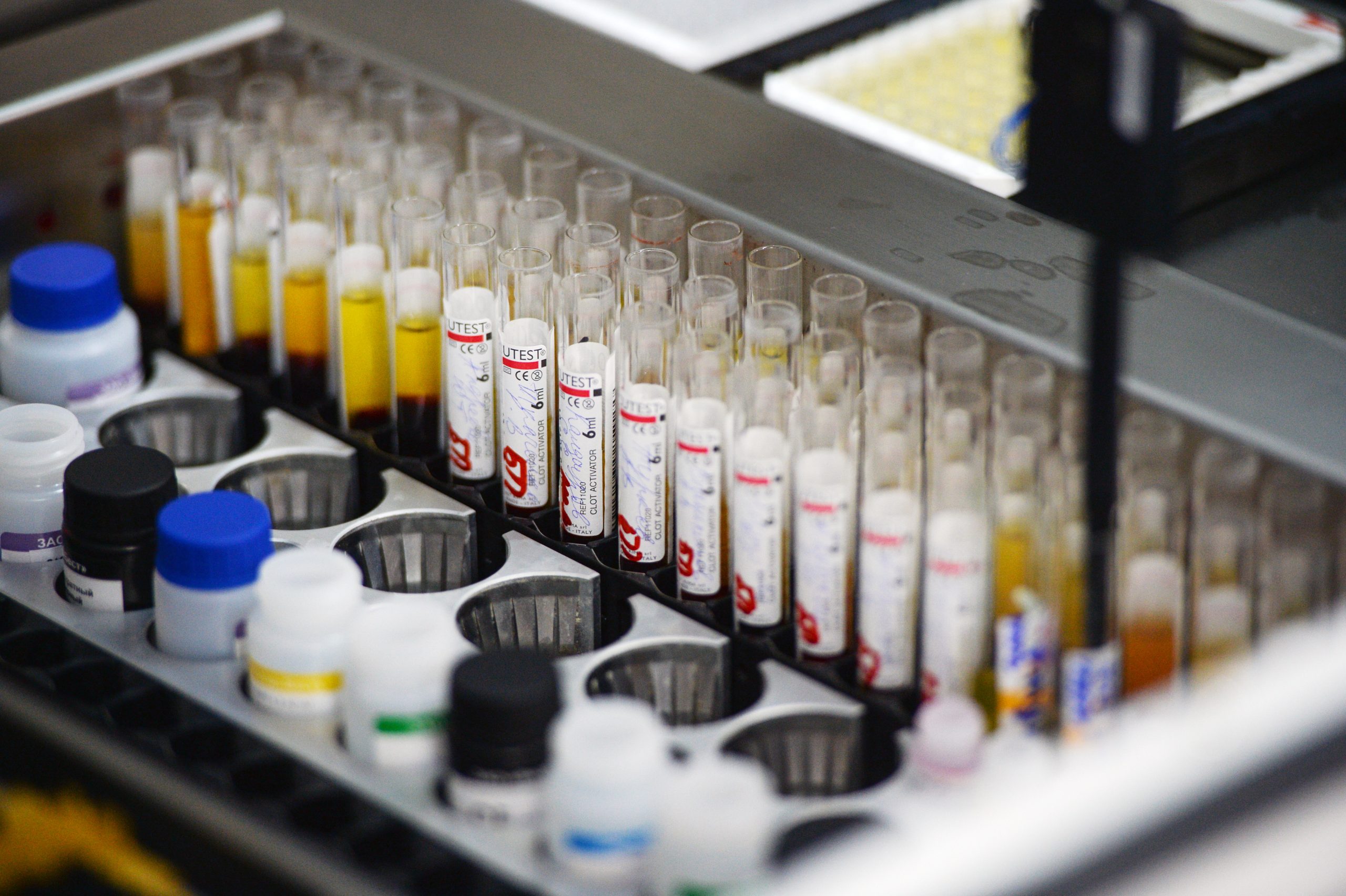Mississippi Today
Mississippi battles 900% increase in babies born with syphilis
Mississippi battles 900% increase in babies born with syphilis
Mississippi is leading the country in syphilis cases, resulting in a tragic uptick of newborns risking death from the disease across the state.
Mississippi has had a more than 900% increase in babies born with syphilis – a sexually transmitted disease that is also passed to an infant during pregnancy – in six years ending in 2021. Syphilis can cause miscarriages and death. Surviving children born with the disease can have major malformations and life-long complications.
The Centers for Disease Control and Prevention reported preliminary data that 2,677 babies nationwide born with congenital syphilis in 2021. It was the highest number reported in one year since 1994. Case counts have been rising steadily since 2013.
“It’s absolutely alarming and shocking,” said former State Health Officer Dr. Thomas Dobbs, “and it’s totally preventable.”
Dobbs now leads the University of Mississippi Medical Center’s School of Population Health. He and other leading health care officials in the state are trying to warn parents and colleagues about the growing problem.
“Years past, it was a rare and uncommon event (at Forrest General Hospital), where we had a couple babies per year with congenital syphilis,” said Dr. Anita Henderson, a pediatrician at The Pediatric Clinic in Hattiesburg. “Now, we are seeing babies on a monthly, sometimes weekly basis, who test positive from mothers who received partial treatment, or no treatment.”
Syphilis is treated effectively with penicillin. Despite a simple cure, Mississippians are continuing to contract and pass along the illness with dire consequences.
In 2016, eight babies in Mississippi were born and hospitalized with syphilis. In 2021, that number hit 106, according to data Dobbs shared based on health department and hospital discharge numbers. While syphilis cases in infants have gone up nationwide, Mississippi’s rate of increase is nearly five times the national average.
“The numbers are bad,” said Dr. Charlotte Hobbs, a professor of pediatric infectious disease and microbiology at UMMC, “and they’re just going to get worse.”
Mississippi is tied with Nevada for the leading rate of overall cases of syphilis per population of 100,000.
Most states require syphilis screenings in pregnancy by law, but Mississippi is one of six that doesn’t. Without mandatory screenings, some mothers are shocked to learn they even have the disease. They may not have symptoms, and by the time they do find out, it’s sometimes too late.
State Epidemiologist Paul Byers recently told NBC the Department of Health is exploring the possibility of a testing mandate through its regulatory authority.
“The messaging isn’t always clear,” Hobbs said, “but syphilis can kill your baby and it can kill you.”
Henderson said it largely comes down to a lack of sexually transmitted disease education. Sometimes those who have syphilis don’t realize a single dose of treatment isn’t enough to eradicate the infection and they need multiple doses. Maybe they were treated, but their partner never was, and they got reinfected.
“I do think they are surprised to learn syphilis can cause problems with the baby,” Henderson said. “Syphilis is easily treated … so it is not something people think about a cause of death in children in 2023. But we have had several babies die and many other suffering long term issues.”
Dobbs said poorer women – usually women of color – especially struggle to access prenatal health care. Nearly 71% of the babies born and hospitalized with syphilis in Mississippi in 2021 were Black, according to data provided by Dobbs. It’s another example of the state’s alarming health care disparities in treatment of the Black population in Mississippi.
Transportation is a major barrier. OB-GYN offices can be a long haul from rural portions of the state, and county health clinics are dealing with major nursing and staff shortages. County health clinics may offer free syphilis screenings, but nine locations have closed in recent years, and more have reduced their hours.
“We don’t have a comprehensive support network where women are accessing prenatal care,” Dobbs said.
He sees that as the largest barrier. Another comes with how difficult it is for expecting mothers and parents to access health care in general, especially under Medicaid. That’s why doctors across Mississippi are pushing for the state’s Medicaid coverage to include presumption of eligibility during pregnancies. A bill in the House that would have sped up access to care for mothers at lower income thresholds during pregnancy already died this session.
It’s not uncommon for an expecting mother to wait more than a month before their public health insurance is approved after they become aware of their pregnancy. That public health insurance covers about 65% of the state’s pregnancies.
Doctors offices often won’t see pregnant patients until they have their coverage card in hand – which could mean missing out on penicillin treatments in the first trimester, when outcomes would be the most favorable.
Penicillin treatments, though relatively simple, are pricey. Doctors’ offices often don’t want to take on that expense without the assurance they will be paid back.
“Women of a reproductive age need to have regular health care to have proper family resources,” Dobb said. “Women should be empowered to time births consistent with their desires, with the counseling of physicians.”
But in Mississippi that access often isn’t easy to come by. Dobbs said the syphilis outbreak is a reflection on the depletion of Department of Health resources.
“If your health department doesn’t have anybody in them, you can’t get tested or treated,” Dobbs said. “Those are the bread-and-butter pieces of syphilis control. Over the past two decades, public health has deteriorated remarkably.”
Now, an increasing number of children in Mississippi are living with the consequences.
This article first appeared on Mississippi Today and is republished here under a Creative Commons license.
Mississippi Today
UMMC hospital madison county
The University of Mississippi Medical Center has acquired Canton-based Merit Health Madison and is preparing to move a pediatric clinic to Madison, continuing a trend of moving services to Jackson’s suburbs.
The 67-bed hospital, now called UMMC Madison, will provide a wide range of community hospital services, including emergency services, medical-surgical care, intensive care, cardiology, neurology, general surgery and radiology services. It also will serve as a training site for medical students, and it plans to offer OB-GYN care in the future.
“As Mississippi’s only academic medical center, we must continue to be focused on our three-part mission to educate the next generation of health care providers, conduct impactful research and deliver accessible high-quality health care,” Dr. LouAnn Woodward, UMMC’s vice chancellor of health affairs, said in a statement. “Every decision we make is rooted in our mission.”
The new facility will help address space constraints at the medical center’s main campus in Jackson by freeing up hospital beds, imaging services and operating areas, said Dr. Alan Jones, associate vice chancellor for health affairs.
UMMC physicians have performed surgeries and other procedures at the hospital in Madison since 2019. UMMC became the full owner of the hospital May 1 after purchasing it from Franklin, Tennessee-based Community Health Systems.
The Batson Kids Clinic, which offers pediatric primary care, will move to the former Mississippi Center for Advanced Medicine location in Madison. This space will allow the medical center to offer pediatric primary care and specialty services and resolve space issues that prevent the clinic from adding new providers, according to Institutions of Higher Learning board minutes.
A UMMC spokesperson did not respond to questions about the services that will be offered at the clinic or when it will begin accepting patients.
The Mississippi Center for Advanced Medicine, a pediatric subspecialty clinic, closed last year as a result of a settlement in a seven-year legal battle between the clinic and UMMC in a federal trade secrets lawsuit.
The changes come after the opening of UMMC’s Colony Park South clinic in Ridgeland in February. The clinic offers a range of specialty outpatient services, including surgical services. Another Ridgeland UMMC clinic, Colony Park North, will open in 2026.
The expansion of UMMC clinical services to Madison County has been criticized by state lawmakers and Jackson city leaders. The medical center does not need state approval to open new educational facilities. Critics say UMMC has used this exemption to locate facilities in wealthier, whiter neighborhoods outside Jackson while reducing services in the city.
UMMC did not respond to a request for comment about its movement of services to Madison County.
UMMC began removing clinical services this year from Jackson Medical Mall, which is in a majority-Black neighborhood with a high poverty rate. The medical center plans to reduce its square footage at the mall by about 75% in the next year.
The movement of health care services from Jackson to the suburbs is a “very troubling trend” that will make it more difficult for Jackson residents to access care, Democratic state Sen. John Horhn, who will become Jackson’s mayor July 1, previously told Mississippi Today.
Lawmakers sought to rein in UMMC’s expansion outside Jackson this year by passing a bill that would require the medical center to receive state approval before opening new educational medical facilities in areas other than the vicinity of its main campus and Jackson Medical Mall. Republican Gov. Tate Reeves vetoed the legislation, saying he opposed an unrelated provision in the bill.
This article first appeared on Mississippi Today and is republished here under a Creative Commons Attribution-NoDerivatives 4.0 International License.
The post UMMC hospital madison county appeared first on mississippitoday.org
Note: The following A.I. based commentary is not part of the original article, reproduced above, but is offered in the hopes that it will promote greater media literacy and critical thinking, by making any potential bias more visible to the reader –Staff Editor.
Political Bias Rating: Center-Left
The article presents a primarily factual report on UMMC’s expansion into Madison County, outlining the medical center’s services and strategic decisions while including critiques from Democratic leaders and local officials about the suburban shift. The inclusion of concerns over equity and access—highlighting that the expansion is occurring in wealthier, whiter suburbs at the expense of services in majority-Black, poorer neighborhoods—leans the piece toward a center-left perspective, emphasizing social justice and community impact. However, the article maintains a measured tone by presenting statements from UMMC representatives and government officials without overt editorializing, thus keeping the overall coverage grounded in balanced reporting with a slight progressive framing.
Mississippi Today
Rita Brent, Q Parker headline ‘Medgar at 100’ Concert
Nationally known comedian Rita Brent will host the Medgar & Myrlie Evers Institute’s “Medgar at 100” Concert on June 28.
Tickets go on sale Saturday, June 14, and can be ordered on the institute’s website.
The concert will take place at the Jackson Convention Complex and is the capstone event of the “Medgar at 100” Celebration. Organizers are calling the event “a cultural tribute and concert honoring the enduring legacy of Medgar Wiley Evers.”
“My father believed in the power of people coming together — not just in protest, but in joy and purpose, and my mother and father loved music,” said Reena Evers-Everette, executive director of the institute. “This evening is about honoring his legacy with soul, celebration, and a shared commitment to carry his work forward. Through music and unity, we are creating space for remembrance, resilience, and the rising voices of a new generation.”
In addition to Brent, other featured performers include: actress, comedian and singer Tisha Campbell; soul R&B powerhouse Leela James; and Grammy award-winning artist, actor, entrepreneur and philanthropist Q Parker and Friends.
Organizers said the concert is also “a call to action — a gathering rooted in remembrance, resistance, and renewal.”
Proceeds from the event will go to support the Medgar & Myrlie Evers Institute’s mission to “advance civic engagement, develop youth leadership, and continue the fight for justice in Mississippi and beyond.”
This article first appeared on Mississippi Today and is republished here under a Creative Commons Attribution-NoDerivatives 4.0 International License.
The post Rita Brent, Q Parker headline 'Medgar at 100' Concert appeared first on mississippitoday.org
Note: The following A.I. based commentary is not part of the original article, reproduced above, but is offered in the hopes that it will promote greater media literacy and critical thinking, by making any potential bias more visible to the reader –Staff Editor.
Political Bias Rating: Centrist
This article presents a straightforward, factual report on the upcoming “Medgar at 100” concert honoring civil rights leader Medgar Wiley Evers. The tone is respectful and celebratory, focusing on the event’s cultural and community significance without expressing a political stance or ideological bias. It quotes organizers and highlights performers while emphasizing themes of remembrance, unity, and justice. The coverage remains neutral by reporting the event details and mission of the Medgar & Myrlie Evers Institute without editorializing or promoting a specific political viewpoint. Overall, it maintains balanced and informative reporting.
Mississippi Today
Future uncertain for residents of abandoned south Jackson apartment complex
Residents at Chapel Ridge Apartments in Jackson are left wondering what to do next after months dealing with trash pileups, property theft and the possibility of water shutoffs due to the property owner skipping out on the bill.
On Sunday, Ward 5 Councilman Vernon Hartley, city attorney Drew Martin and code enforcement officers discussed next steps for the complex, which, since April 30, has been without a property manager.
“How are you all cracking down on other possible fraudulent property managers around Jackson?” one woman asked Martin.
“ We don’t know they’re there until we know they’re there, and I know that’s a terrible answer, but I don’t personally have another one I’m aware of right now,” Martin said. “These individuals don’t seem to have owned another apartment complex in the Metro Jackson area, despite owning a whole bunch nationwide.”
Back in April, a letter was left on the door of the leasing office advising residents to not make rental payments until a new property manager arrives. The previous property managers are Lynd Management Group, a company based in San Antonio, Texas.
The complex has been under increased scrutiny after Chapel Ridge Apartments lost its solid waste contract mid-March due to months of nonpayment. The removal of dumpsters led to a portion of the parking lot turning into a dumping site, an influx of rodents and gnats, and an investigation by the Mississippi Department of Environmental Quality. Local leaders pitched in to help remedy the situation, and in May, Waste Management provided two dumpsters for the complex.
However, the problems persisted. In May, JXN Water released the names of 15 apartment complexes that owe more than $100,000 in unpaid water fees. Chapel Ridge was on the list. JXN Water spokesperson Aisha Carson said via email that they are “pursuing legal options to address these large-scale delinquencies across several properties.”

“While no shutoffs are imminent at this time, we are evaluating each case based on legal feasibility and the need to balance enforcement with tenant protections. Our focus is on transparency and accountability, not disruption—but we will act when needed to ensure the integrity of the system,” Carson said.
And earlier this week, Chapel Ridge Apartments was declared a public nuisance. Martin said this gives the city of Jackson “the authority to come in, mow the grass and board up any of the units where people aren’t living.”
Martin said the situation is complicated, because the complex is owned by Chapel Ridge Apartments LLC. The limited liability corporation is owned by CRBM Realty Inc. and Crown Capital Holdings LLC, which are ultimately owned by Moshe “Mark” Silber. In April, Silber was sentenced to 30 months in prison for conspiracy to commit wire fraud affecting a financial institution. Earlier this month, both companies filed for bankruptcy in New Jersey.

Now, Martin said the main goal is to find someone who can manage the property.
“Somebody’s got to be able to collect rent from you,” Martin said. “They got to be able to pay the water. They got to be able to pay the garbage. They got to be able to pay for the lights to be on. They got to maintain the property, so that’s our goal is to put that in place.”
Chapel Ridge offers a rent scale based on household income. Those earning under 50% of the area median income — between $21,800 and $36,150 depending on household size — for example, pay $480 for a two-bedroom and $539 for a three-bedroom unit. Rent increases between $20 and $40 for those earning under 60% of the area median income.
Valarie Banks said that when she moved into Chapel Ridge nearly 13 years ago, it was a great community. The disabled mother and grandmother moved from West Jackson to the complex because it was neatly kept and quiet.
“It was beautiful. I saw a lot of kids out playing. There were people that were engaging you when you came out. They were eager to help,” Banks said. “ I hope that they could bring this place back to the way it once was.”
But after months of uncertainty, Banks is preparing to move. She said she’s not the only one.
“I have somewhere to go, but I’m just trying to get my money together so I can be able to handle the deposits and the bills that come after you move,” she said. “All of my doctors are around here close to me. In 12 years, I made this place home for me. … I’ve been stacking my rent, but it’s still not enough if I want to move this month.”
While she said she’s holding onto her rent payments for the time being, she realizes that many of her fellow residents may not be as lucky. Without someone to maintain the apartments, some residents are finding themselves without basic amenities.
“Some people are in dire straits, because they don’t have a stove or a fridge or the air conditioner,” she said. “Their stove went out, or the fridge went out, or they stole the air conditioner while you’re in the apartment.”
Banks isn’t the only one who is formulating a plan to leave. One woman, who asked to remain anonymous, said she’s been trying to save money to move, but she already has $354 wrapped up in a money order that she’s unable to pass off for her rent, due to the property manager’s recent departure.
“It really feels like an abandonment and just stressful to live where I’m living at right now. This just doesn’t happen. It just feels stressful. It doesn’t feel good at all,” she said.
She’s trying to remain optimistic, but as each day passes without someone to maintain the property, she’s losing hope.
“ I just hope that things get better some day, somehow, hopefully, because if not, more than likely I’m going to have to leave because I can only take so much,” she said. “I can’t continue to deal with this situation of hoping and wishing somebody comes, and they don’t.”
This article first appeared on Mississippi Today and is republished here under a Creative Commons Attribution-NoDerivatives 4.0 International License.
The post Future uncertain for residents of abandoned south Jackson apartment complex appeared first on mississippitoday.org
Note: The following A.I. based commentary is not part of the original article, reproduced above, but is offered in the hopes that it will promote greater media literacy and critical thinking, by making any potential bias more visible to the reader –Staff Editor.
Political Bias Rating: Center-Left
This article from *Mississippi Today* primarily focuses on the struggles of low-income residents at Chapel Ridge Apartments, emphasizing the human impact of property mismanagement, regulatory gaps, and systemic neglect. The piece maintains a factual tone, but it centers the voices of vulnerable tenants and local officials seeking accountability—hallmarks of a center-left perspective. While it does not overtly advocate for policy change, the narrative framing highlights social injustice and institutional failures, subtly aligning with progressive concerns about housing equity and corporate responsibility.
-
Mississippi Today5 days ago
Retired military officer: In America, the military is not used against its own citizens for law enforcement
-
News from the South - Missouri News Feed5 days ago
Repeated problems at Raytown park frustrate neighbors
-
News from the South - Alabama News Feed7 days ago
Deadly Sunday in Mobile County leaves 5 people dead
-
News from the South - Georgia News Feed7 days ago
Georgia GOP's attempt to block Brad Raffensperger from running as a Republican may go nowhere
-
News from the South - Alabama News Feed6 days ago
News 5 NOW at 8:00am |Tuesday, June 10, 2025
-
News from the South - South Carolina News Feed7 days ago
SLED investigates Florence traffic stop amid racial profiling allegations
-
News from the South - Florida News Feed4 days ago
Former Jacksonville radio host Mark Kaye announces he’s running for Congress, bashes current Rep. John Rutherford
-
News from the South - Florida News Feed7 days ago
HHS Secretary Robert F. Kennedy Jr. firing every member of panel that makes vaccine recommendations


















































